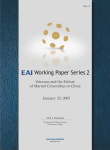
The balance of power and state interests in international relations
워킹페이퍼 | 2007-01-27
David C. Kang
EAI Fellows Program Working Paper Series No.5
요약문
A central debate in the field of international relations concerns the extent of balancing behavior. Kenneth Waltz’s confident assertion that “hegemony leads to balance,” and has done so “through all of the centuries we can contemplate”—is perhaps the default proposition in international relations. 1 Yet in recent years, the balancing proposition has come under increasing empirical and theoretical scrutiny. Empirically, the absence of obvious balancing against the United States in the post-Cold War era led to a scholarly debate about why that might be the case.2 Theoretically, advances by scholars working in both the rationalist and constructivist traditions have pointed out the myriad of ways in which state strategies depend on more than purely the distribution of power.3
저자
David Kang is Associate Professor of Government, and Adjunct Associate Professor and Research Director at the Center for International Business at the Tuck School of Business at Dartmouth. Kang is author of China Reshapes East Asia: Power, Politics, and Ideas in International Relations (Columbia University Press, forthcoming). He has also written Crony Capitalism: Corruption and Development in South Korea and the Philippines (Cambridge University Press, 2002), and Nuclear North Korea: A Debate on Engagement Strategies (coauthored with Victor Cha) (Columbia University Press, 2003).
 본 working paper는 미국 헨리루스재단의 지원을 받은 "EAI Fellows Program on Peace, Governance, and Development in East Asia"에 제출된 논문이며, 온라인 버전으로만 배포됩니다.
본 working paper는 미국 헨리루스재단의 지원을 받은 "EAI Fellows Program on Peace, Governance, and Development in East Asia"에 제출된 논문이며, 온라인 버전으로만 배포됩니다.
A central debate in the field of international relations concerns the extent of balancing behavior. Kenneth Waltz’s confident assertion that “hegemony leads to balance,” and has done so “through all of the centuries we can contemplate”—is perhaps the default proposition in international relations. 1 Yet in recent years, the balancing proposition has come under increasing empirical and theoretical scrutiny. Empirically, the absence of obvious balancing against the United States in the post-Cold War era led to a scholarly debate about why that might be the case.2 Theoretically, advances by scholars working in both the rationalist and constructivist traditions have pointed out the myriad of ways in which state strategies depend on more than purely the distribution of power.3
However, scholars are only in the beginning stages of focusing on another case that has the potential to yield significant insights into this debate: China. In the past three decades, China has rapidly emerged as a major regional and global power. Since the introduction of its market reforms in 1978, China has averaged over nine percent economic growth. Foreign businesses have flocked to invest in China, and Chinese exports have begun to flood world markets. China is modernizing its military, has joined numerous regional and international institutions, and is increasingly visible in international politics. However, although it would appear that these conditions are ripe for balancing behavior, China appears to have managed to emerge without provoking a regional backlash. 4
South Korea presents perhaps the clearest example of this anomaly. A balance of power perspective would expect South Korea to fear a rapidly growing, geographically and demographically massive authoritarian and communist China that sits on its border. Not only does China already have the military capability to threaten the peninsula, but the power disparity is widening. China also maintains close relations with North Korea – South Korea’s main external threat since 1945. Furthermore, the US and South Korea have enjoyed a close alliance for over a half century, and it was onl U.S. miliatry action that prevented the North (in concert with the Chinese) from conquering the South in 1950. Since that time, the U.S. has stationed miliatry forces in South Korea to prevent a second North Korean invasion. For all these reasons, the conventional perspectives would expect that South Korea fears a rapidly rising China and clings to its alliance with the United States...(Continued)